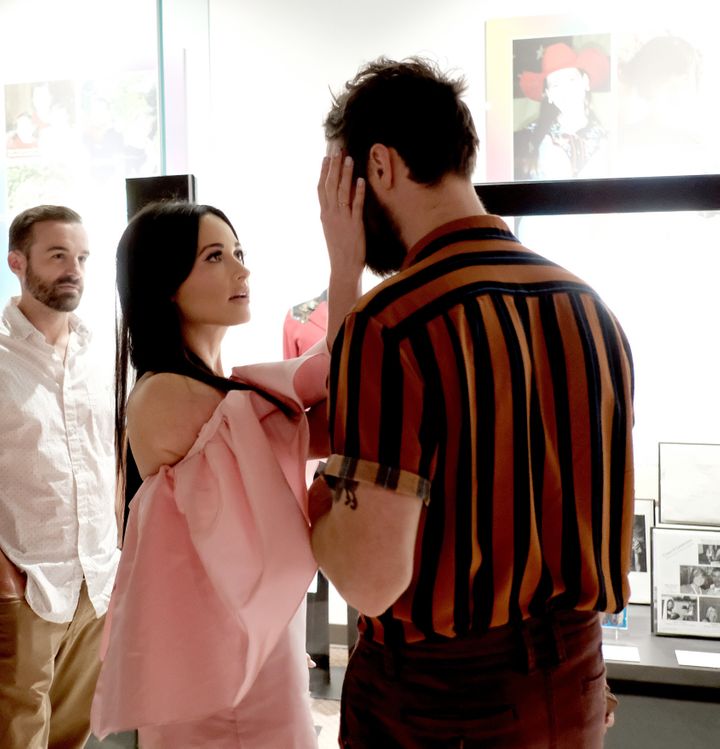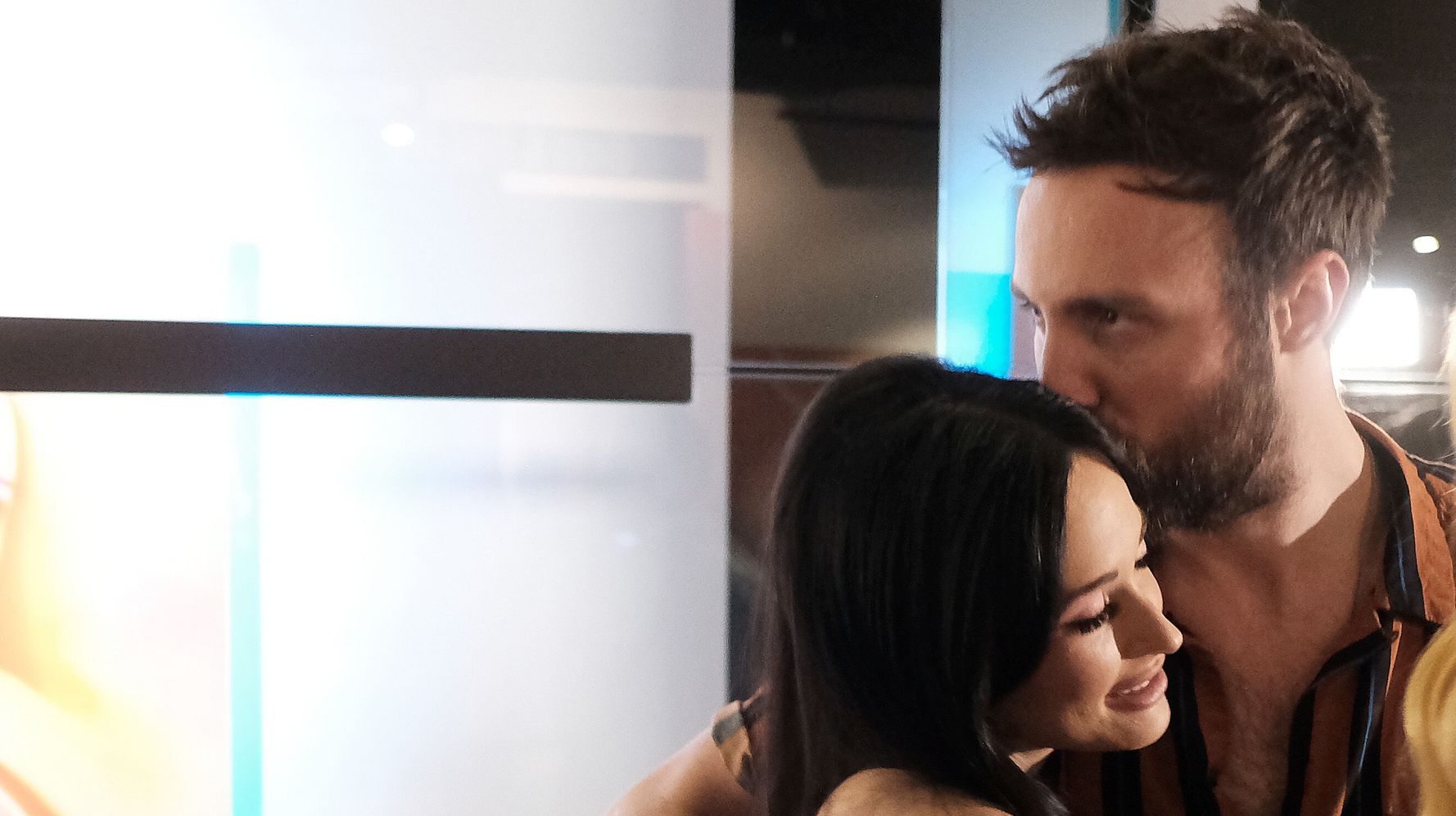[ad_1]
Ruston Kelly was sitting beside his wife, Kacey Musgraves, when the “Golden Hour” songbird won Album of the Year at the 2019 Grammy Awards in February. He was just as shocked as she was, but also honored.
“She’s been at this for a long time. She’s been a performer her entire life, so it was an honor to see the culmination of all of her efforts through the years,” Kelly, a fellow musician, told HuffPost of the success of Musgraves’ fourth studio album. “Love really transformed and transfixed something special in both of our lives. For her to be awarded in light of that love is certainly a great honor for me.”
Musgraves has been open about how her romance with Kelly inspired the album, released in March 2018, five months after the couple wed in Tennessee.
“It was kind of like the universe was saying that you need to be present and, I don’t know, witness this beautiful thing that’s happening,” she told HuffPost’s Travis Waldron when “Golden Hour” was released. “It led me to kind of focus on the positive and beautiful elements of this earth and this relationship I’m in, despite the fact that the social and political landscape is a little unnerving in a lot of ways.”
Kelly has that same mindset when it comes to his own artistry. Fueled by his newfound sobriety, the 31-year-old singer-songwriter recently defined his own genre of music after releasing a daring and emotive debut studio album, “Dying Star,” last fall. He collaborated with an array of female songwriters, including The Civil Wars’ Joy Williams and The Highwomen’s Natalie Hemby.
And although Kelly wrote the majority of the songs before he met Musgraves, her entrance into his life surely affected his ability to close the book on a difficult chapter.
“It wouldn’t have a small, silver thread of hope through it, especially toward the end, if it weren’t for her,” he said. “[She helped me] to say, ‘I can move on from this and I cannot be afraid of what the next chapter is.’ To be openly willing to just let it be.”
“That’s something that I think love goes hand-in-hand with,” he added. “Real love shows you who you are in a lot of ways, who you feel like you can aspire to be just as a human being. I mean, that’s the brightest type of love, and that definitely was our spark. When we met, it affected us artistically, for sure.”

When asked about the journey of making a name for himself while witnessing Musgraves’ star rise and rise after her Grammy win, Kelly was humble.
“Awards can represent greatness for sure, and in my wife’s case, I feel like it’s totally appropriate,” Kelly said. “But as far as greatness is concerned, everyone has their own sense of what that is and what they’re going to do when they get it and how they embody it. I feel like that’s the beauty of, not the industry, but of creation and art.”
“So I try not to associate pride with any of that, because what is there to be proud of other than someone you love’s accomplishments?”
Kelly’s own strength stems from his creativity. His new eight-track cover album, “Dirt Emo: Vol. 1,” is a demonstration of his style of music as he reimagines pop-punk hits as Americana tunes. He wanted to better define himself after many deemed “Dying Star” a country album.
“I just love the sound of steel guitar and wooden instruments,” he said. “And ‘Dirt Emo’ was like, ‘OK, this is the sub-music that I play … confessional songwriting, confessional lyrics, emotional vulnerability to the max with folk instrumentation on the periphery.’”
Kelly made connections between artists who inspired him ― everyone from The Used and Taking Back Sunday to Jackson Browne and The Eagles ― and began reworking “quasi-rebellious” songs like Wheatus’ “Teenage Dirtbag,” Dashboard Confessional’s “Screaming Infidelities” and even Taylor Swift’s “All Too Well.”
“It was really difficult to pick songs because there are some gems in that genre and in that era of music,” Kelly said. “But I did the ones that I feel like shape my mentality about what music is to me and the type of music that I make.”
As for Swift, Kelly has always been a huge fan of the country princess-turned-pop queen because of her vulnerability. “That’s kind of a quintessential element of music creation and, I guess, art in general ― to roughly explain through a raw sense of self who you are and what you feel.”
When Swift posted about Kelly’s rendition of “All Too Well” on her Instagram stories earlier this year, he was floored ― grateful that she would share his work with her 123 million followers. He also wished he would’ve asked her to collaborate before he recorded the song, considering he eventually got Chris Carrabba of Dashboard to duet with him on “Screaming Infidelities.” Carrabba actually reached out to Kelly about writing together after discovering “Dying Star.” They eventually performed Kelly’s song “Mercury” onstage, and the rest is “Dirt Emo” history.
“It just happened organically, like all fun things in this industry,” Kelly said. “It just felt natural from step one.”
Although he plans to do more installments of his “Dirt Emo” series, Kelly is now focused on his sophomore effort ― an album he’s recording in an old church near Woodstock, New York, dubbed Dreamland Studios.
“Where ‘Dying Star’ is more floating in the abyss, unsure of whether you’re sinking or rising to the top, this album is head out of the water, see the shore and I’m heading straight for it,” he said. “It’s kind of like, ‘What is life like out of the woods? What does that entail as far as your mental health and your perspective about yourself in the world?’”
Kelly’s place in the world is with Musgraves, who has motivated him personally and professionally. In terms of songwriting, Kelly says he chooses to work with women because he feels their energy brings him a sense of tranquility.
“Of course the masculine spirit is important, too, but our culture is so lopsided when it comes to that,” he said. “I don’t even think it’s a reflection of sensitivity
at all. I think the feminine spirit is powerful. It’s really, really powerful. And to be around it, I respect humanity even more.”
When told that he’s probably married to one of the most spirited women alive, Kelly chuckled: “I would agree!”
Calling all HuffPost superfans!
Sign up for membership to become a founding member and help shape HuffPost’s next chapter
[ad_2]
Source link

